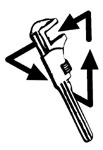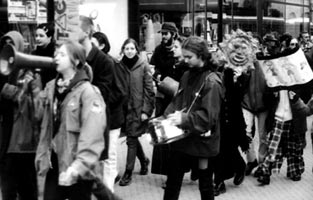|
|
|||||||||||||||||||||
AUTONOMOUS CULTURE FACTORY
Marko Vukovic
PoliticsIn order to make some sense out of the present we always need to go back in time. This story takes us back to the beginning of the 1990s when the process of transition started to change many societies that are now labeled "post-socialist." The shift in ex-Yugoslavia took a different course, which ended in a tragic war. The sequence of events in an irreversible history brought rigid nationalists (HDZ and Franjo Tuðman) to power and assured that they would stay there for another ten years.
This might seem like a pretentious beginning to a story about a Croatian youth/urban/activist/cultural/political group, but it was the determining context out of which Attack emerged. During the decade of the 1990s, and especially in the post-war years, there developed a constant social conflict between (conditionally speaking) the extremely traditional catholic nationalists who were in power and the "republicans" (As a footnote, it should be remarked that the word is analogous to the situation in Spain during '36-'39, when the entire opposition to Franco was known under one name - the republicans).
As the (sometimes relative, sometimes absolute) power lay in the hands of a regime which was built on traditional values of home, fatherland, and family, the space necessary for a counterculture to develop and exist was simply destroyed. All the clubs were either closed or sold to private entrepreneurs. The non-profit/youth media lost its funding and was faced with the alternative of being shut down or accepting to become the servants of power. The level of state control over the entire public sector was very high and if you weren't a Catholic-Capitalist-Croat (C-C-C) you were automatically excluded from the system. This era culminated in the period around 1995-96 when the country was purged of everything than even resembled the "alternative." Thousands of young people chose to leave Croatia and move Westward...
Birth of a monster
 |
In the eyes of those who had political power any kind of alternative culture was a monster - the other which was most feared because it was so close right under the surface. Autonomous Culture Factory, abbreviated as Attack, was formed as an initiative in 1997 in order to tackle the problems of the lack of space and infrastructure and to try to make possible the conditions for an alternative culture to emerge. The goal was to open and run an autonomous cultural and social center in Zagreb … to bring issues to light that otherwise remained repressed, to reclaim a public space which belonged, in principle, to everyone. In retrospect, the timing seemed to be exactly right: a rather small group of people managed to gain a lot of public support in a very short period of time. We started as a bunch of lunatics that would just take a table, put it out in the street and begin to talk to people ("we've got an idea!") and we ended by having our own rented space within 3 months. At that time, this seemed unthinkable for Zagreb. |
Someone once claimed that the group was using post-modern strategies in a pre-modern society. The society was definitely pre-modern, and whether or not the strategies were "post"-modern, they seemed effective: free public events in the parks, demonstrations, street performances, distributed leaflets and posters, web presence, free 'overdesigned' newsletters - all constituting a direct and open approach in a society accustomed to hiding. Introducing direct actions to the streets of Zagreb gave the group a significant momentum. Simply doing things, and doing things in a public space that had previously been closed and protected was an empowering experience for us. And for a public used to many years when it was impossible to think of even simple, small actions for fear of state reaction, it seemed like an important and inevitable change.
Factory of basicsThe Autonomous Culture Factory was an attempt to combine "Autonomous" in the sense of Hakim Bey’s TAZ/PAZ, and the "Factory" model of production in Warhol’s work. Other than a fancy name, the slogan was also meant to provide a concept for the group – a model for radically changing the ways in which culture and politics are produced and consumed. The goal was to create a space making possible a living experiment - an incubator where ideas could be born and implemented.
There was a significant level of interaction between the "hosts" and the visitors as Attack gradually developed into a hang-out place for many young artists. New friendships and projects were born out of chance meetings and improvised encounters. This resulted in a series of joint exhibitions - some were made on the spot while others were selections of older works. In most cases what was exhibited were artifacts that were never shown before as they were to "small" to enter the official spaces of exhibitions.


The Factory's activity also sought to produce a shift in the theater/performance scene. A new generation of performers grew out of this environment, and reciprocally, also played a significant role in the constitution of Attack. There was an initial fusion and collaboration between young performers who were doing weekly street interventions as political gestures and people working in the alternative (sometimes referred to as non-professional) theater. The concrete result was the organization of FAKI (the Festival of Alternative Theater Expression). The first theater festival was held in the streets - which brought a lot of attention to the group and the issues it was dealing with.
The time was very political, and so was the art produced in its context. The most well known action - "22%" - involved a mobilization of performers and visual artists in a protest action against the new tax on books (22%). During one day of action in the summer of 1998 more than 20 events were held. Some were out in the open, like the re-enactment of the scene from the movie Fahrenheit 451 in one of Zagreb’s main squares. Others where staged in bookstores - during one of the most provoking "performances" a group of activists entered the most expensive bookstore in the city and stole books. When they were caught they argued about the price of knowledge, first with the staff and later with the police.
One of the regular and less visible events organized by Attack were the Wednesday night sit ins - gatherings for small groups to share information and discuss topics from the area of civic activism and alternative politics. There were evenings of discussions about Bookchin, Chomsky, Kosovo, the death penalty, electronic civil disobedience, LETS (local exchange trading system), or sometimes just the sharing of travel stories about foreign places. There was no real outcome of the sit ins, other than the possibility to meet people and talk informally. The events and informal conversations, combined with a bar, an infoshop, library, video archive, permanent installations, some tools for renovations, a few boxes of clothes, and a sewing machine made up Attack, the Factory for the production of autonomous culture.
Territory and mobilityThe lack of any institutional space during the 1990s forced the entire urban scene to adapt to the new conditions of scarcity and migration. Without territory, other than the ground they happened to be standing on at the moment and a small fragment of an imaginary (cyber) space, a whole generation learned how to move from one open spot to another. Nomadic tribes were born. High mobility, fast reaction, and the spoken word as the medium of communication. From one-night parties in squatted atomic shelters, to public garages. Events were held in small private bars usually hanging on the edge of bankruptcy, prepared to try anything to survive.
Emerging out of this environment, Attack possessed a lot of experience in dealing with spaces, spaces that didn't exist. It developed a pattern of moving from one place to another. If the group was forced to move from one domain it would simply settle somewhere else, temporarily, and wait for the next opportunity, be it in real space, on a wall, in a magazine, or on the net. The ability to move and adapt was also useful for the group during the period when it shrank and recomposed. A relatively small, determined and experienced group accustomed to tactics and maneuvers managed to prolong the life of the larger group which no longer seemed to be breathing. Movement can sometimes create the impression that something big is still happening, after all the visible signs have vanished.
No strategy, no platformAttack was a group driven by youth, existing without developed strategies or platforms. This was probably our biggest advantage and, simultaneously, our greatest drawback. No strategy and no platform other than the slogan "alternative needs space!" was the only thing that could attract so many supporters. Seeing a group of young people dancing and handing out leaflets in the street early on a Thursday afternoon brought new alliances from those who could not identify as C-C-Cs. The word spread, our visibility rose, and the media started to pay attention. Everything seemed very organic. However, no strategy and no platform also meant organizational problems. Being driven by the impulses and desires of youth meant an abundance of energy, and a lot of inexperience. Organic was often taken for a synonym of "without responsibility." From the point of view of the present, it seems there was no determination or sufficient capability to channel all that energy into anything resembling a structured organization. So Attack's biggest strengths eventually became the heaviest weight tied around its legs.
According to the cynicism of time, which may also be the cynicism of age, Attack appeared as a cell that grew out of proportion, carried on the wings of enthusiasm, until it reached a point at which it actually stated to change people's ways of thinking and began to mean something to the wider public. Eventually, it collapsed out of its own momentum, as there was no skeleton to hold the new organism intact.
A more optimistic vision of this history would be to affirm that Attack has played its role, a role that was as necessary as it was transitory. And the general impression locally is that it has. Its activities have opened up the space for a number of other projects that followed - projects that were better organized and more capable of reaching significant results. Attack still exists as a much smaller group, and continues to occupy a place on the cultural/activist map of Zagreb. But perhaps the most important historical role it can claim was to have offered a glimpse of possibility, and to have been a factory that produced the context for other groups to build an autonomous culture of the future.
Zagreb, December 2001